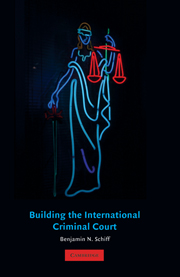Book contents
- Frontmatter
- Contents
- Preface
- Acronyms
- Building the International Criminal Court
- Introduction
- 1 River of Justice
- 2 Learning from the Yugoslavia and Rwanda Tribunals
- 3 The Statute – Justice versus Sovereignty
- 4 Building the Court
- 5 NGOs – Advocates, Assets, Critics, and Goads
- 6 ICC–State Relations
- 7 The First Situations
- 8 Conclusions: The Politics of the International Criminal Court
- Web Sites for Further and Ongoing Information
- Bibliography and Sources
- Index
7 - The First Situations
Published online by Cambridge University Press: 05 September 2012
- Frontmatter
- Contents
- Preface
- Acronyms
- Building the International Criminal Court
- Introduction
- 1 River of Justice
- 2 Learning from the Yugoslavia and Rwanda Tribunals
- 3 The Statute – Justice versus Sovereignty
- 4 Building the Court
- 5 NGOs – Advocates, Assets, Critics, and Goads
- 6 ICC–State Relations
- 7 The First Situations
- 8 Conclusions: The Politics of the International Criminal Court
- Web Sites for Further and Ongoing Information
- Bibliography and Sources
- Index
Summary
The ICC has become deeply enmeshed in four African countries experiencing massive criminal law violations in a web of conflicts ranging from Rwanda in the south to Sudan in the north and the Central African Republic and Chad in the west. By mid-2007, the ICC had four “situations” on its docket. The governments of Uganda, the Democratic Republic of the Congo, and the Central African Republic referred their own situations to the Court. The Darfur, Sudan, situation was referred by the UN Security Council.
The four situations raised common challenges and unique problems for the Court. The sections of this chapter begin with a description of each conflict's background and the sequence of events leading to the Court's involvement. The exposition that follows focuses on aspects of each situation that illuminate particular characteristics of the Court's processes and problems. Uganda, the DRC, and the CAR are all adherents to the ICC Statute, so their self-referrals skirted the problem of situation–state noncooperation with the Court; however, there was the possibility that their governments were seeking to use the ICC for their own purposes in internal conflicts. The Court would need to strive for impartiality even though it had been invited into the countries by their governments. This problem is sometimes called the threat of instrumentalization of the Court. Could the Court carry out investigations and prosecutions under self-referrals without being used by the governments?
- Type
- Chapter
- Information
- Building the International Criminal Court , pp. 194 - 247Publisher: Cambridge University PressPrint publication year: 2008

